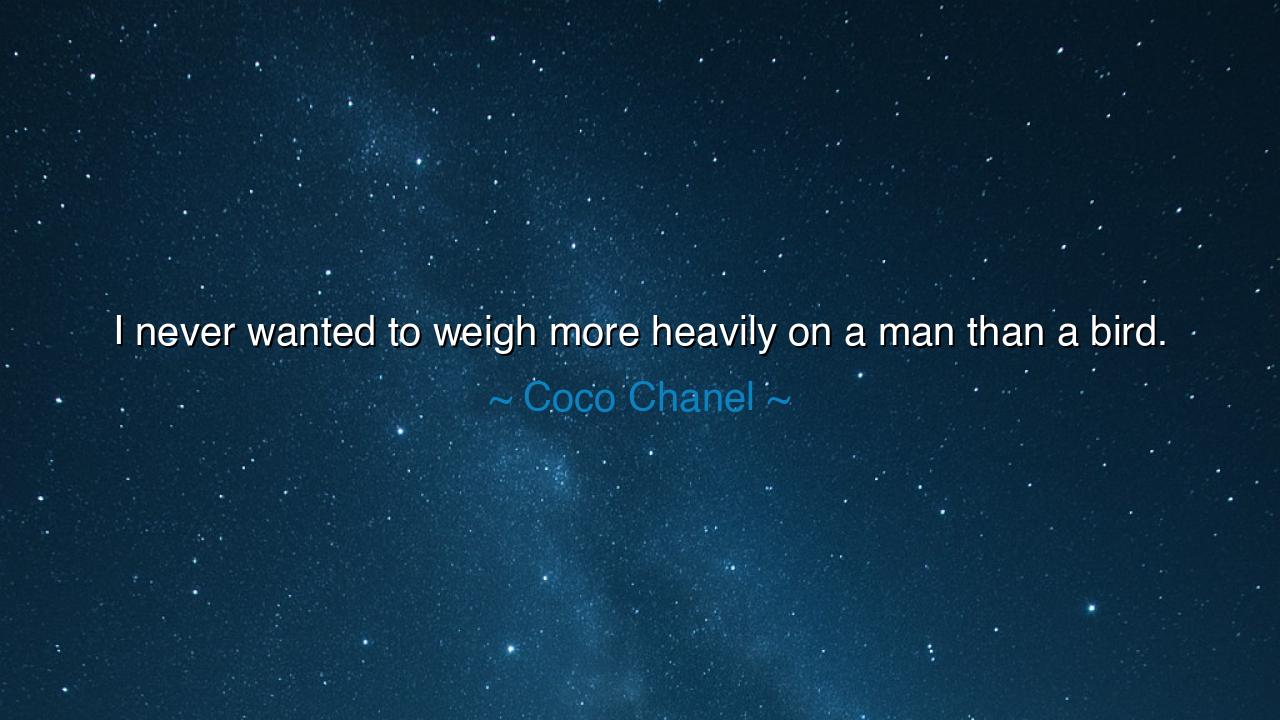
I never wanted to weigh more heavily on a man than a bird.






When Coco Chanel said, “I never wanted to weigh more heavily on a man than a bird,” she was not speaking of the body, but of the spirit. In this poetic declaration, she revealed her lifelong devotion to independence, to freedom of soul and thought. Like the ancients who worshiped the wind and the flight of doves, Chanel longed to move through life unbound, owing her strength to no one but herself. She had seen too many women chained by dependence — gilded cages made of comfort and obedience — and she vowed to be different. Her words are not those of defiance alone, but of grace: she wished to love without burdening, to stand beside men, not beneath them, and to rest upon their shoulders as lightly as a bird rests upon a branch, free to depart when the sky calls.
Chanel’s life gives birth to the truth of her quote. Born into poverty, orphaned young, she climbed from obscurity to become one of the most powerful women in fashion — a realm once ruled entirely by men. She achieved this not by surrendering her femininity, but by redefining it. She replaced corsets with simplicity, excess with elegant freedom, and dependency with self-reliance. When she said she wished not to weigh heavily upon a man, she spoke for all women who desire to love without losing themselves — to walk in partnership, not in servitude. To her, a woman’s worth must be her own creation, not borrowed from the man beside her.
The ancients would have seen in Chanel a spirit akin to Artemis, the goddess of the hunt and of independence, who roamed the forests alone beneath the moonlight, beholden to no man’s command. Like Artemis, Chanel cherished freedom not as rebellion but as dignity. She believed that love is strongest when it does not cage either the giver or the receiver. To weigh too heavily, to cling, is to destroy both the beauty of affection and the respect that sustains it. Love, she teaches us, must be light — not because it lacks depth, but because it allows both souls to breathe.
There is also in her words an understanding of the fragility of balance in relationships. A bird can rest upon a hand only if the hand remains still. Likewise, harmony between two souls exists only when both allow the other to remain free. Chanel’s refusal to depend too deeply on any man was not arrogance, but self-preservation. She saw that too often, women who leaned too heavily were crushed by disappointment, while those who stood on their own feet could walk even after love had flown. Her wisdom lies in knowing that to love without losing one’s freedom is the highest form of love — for it is chosen, not needed.
Consider the story of Eleanor of Aquitaine, queen, crusader, and mother of kings, who centuries before Chanel embodied the same fierce independence. Though she ruled beside powerful men — first Louis VII of France, then Henry II of England — she was never content to be a shadow. When kings faltered, she governed; when her marriage to Henry turned to conflict, she stood against him and shaped the course of history. Like Chanel, Eleanor refused to be merely an ornament of power — she was power, cloaked in grace. Both women lived by the creed that love should adorn life, not define it.
Chanel’s quote also hides a deeper philosophical truth about the nature of strength. To weigh lightly is not to be weak — it is to possess control, to hold one’s emotions and desires with mastery. The strongest tree bends with the wind; the bird survives the storm by rising above it. Chanel’s vision of womanhood was not submission, nor domination, but equilibrium. She sought to bring to the world a new image of the feminine — not fragile, but flexible; not dependent, but interdependent. Her spirit reminds us that true elegance lies in restraint, in the power to carry oneself with composure even when love tempts us to surrender.
The lesson her words impart is timeless: do not let your happiness rest entirely upon another. Let love enrich you, but not define you. Whether man or woman, learn to be whole within yourself first — for the love that springs from wholeness is the only love that lasts. Cultivate the independence of the mind, the discipline of self-respect, and the grace of self-possession. Only then can you love as lightly as a bird — able to perch without clinging, to stay without fear, and to fly without regret.
So, O listener, remember Chanel’s wisdom. Do not weigh heavily upon any soul, nor allow any soul to weigh too heavily upon you. Build your strength as she built her empire — upon the firm foundation of freedom and the quiet power of dignity. For the love that endures is not the one that binds, but the one that allows both hearts to soar — side by side, beneath the same sky, in perfect, weightless balance.






AAdministratorAdministrator
Welcome, honored guests. Please leave a comment, we will respond soon